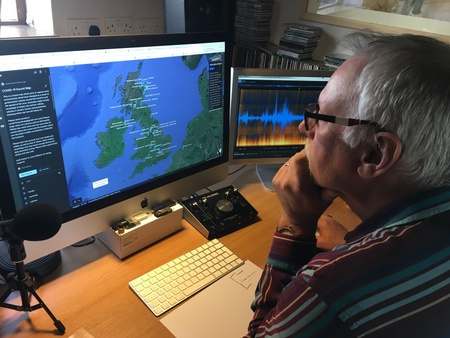A University of Aberdeen sound artist has launched a project to capture in sound the changes in our environment as a result of the Covid-19 lockdown.
Professor Pete Stollery, a specialist in sound art and sound mapping, is seeking the help of the public to preserve and reflect on this unique period in time, which is changing the sounds around us as well as the way in which we live our lives.
Professor Stollery said: “After just a couple of days in lockdown, the transformation in our aural environment was quite astounding.
“There are fewer cars on the road, planes are no longer overhead, noise from construction sites has ceased and the sounds of nature are once again coming to the fore.
“My work focuses on enabling listeners to become aware of the intrinsic qualities of the sounds themselves and I thought it would be important to capture the sounds of this unique time.
“While it is not a situation any of us would choose, it is something we are unlikely to experience in quite this way ever again.”
Professor Stollery put out a call for help on his own social media channels and has already received more than 100 sound files from around the world which he is now uploading to Google Earth so that when visitors click on pins on the map, they can listen to life during lockdown at that location.
“I’ve had recordings sent to me from all over the UK as well as from Chile, Turkey, Greece, France, Germany, Spain, Italy, Belgium, the US and Canada,” he added.
“Normally I would go out and make the recordings myself but current restrictions mean this is not possible. However, utilising citizen research is enabling a greater reach than it would ever be possible for me to achieve and, given that Covid-19 is affecting people in all corners of the world and has changed day-to-day life everywhere, it is appropriate to attempt to cover as many places as possible.”
Professor Stollery is now seeking volunteers to record sounds around them during the Covid-19 crisis, anything from birdsong and insect noise that can now be heard to announcements in railway stations, supermarkets and recordings of the Thursday night #clapforourcarers - or any other sounds that captures attention.
He said: “When you strip back all of the other background noise, you become much more acutely aware of the sounds around you that you perhaps normally ignore.
“If you have a smartphone and can make a short recording as either an audio or video file,it can become part of a sound map that people can enjoy both now and in the future.”
Recordings can be sent to covid19soundmap@gmail.com along with a short description of how the sound is relevant to the lockdown and details of the location. Sounds already mapped can be enjoyed at www.tinyurl.com/covid19soundmap


